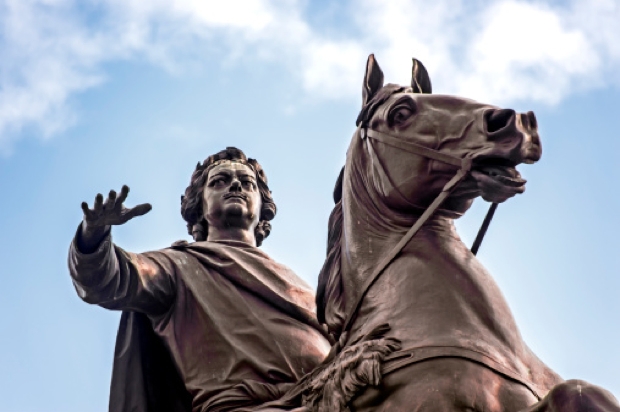I suppose the secret of death is to choose not to expire the same day as famous people. I read in Lapham’s Quarterly that JFK, C.S. Lewis and Aldous Huxley all met with the man in the white suit on 22 November 1963.
John Jay Mortimer, a friend of very long standing, died last week and I attended his funeral in Tuxedo Park, the seat of his very old and fine family. After his daughter Minnie gave the reading, Lewis Lapham, the renowned editor of Harper’s and now Lapham’s Quarterly, spoke in a quiet, unemotional tone about his old friend. It seems that at the height of the Cold War, a Soviet bigwig editor had come to New York for a lunch with Lewis. The latter invited John Jay to come along because of his impeccable knowledge of Russian history as well as his fluency in Russian. Well, you can guess the rest. One vodka toast to peace and friendly co-operation followed another, and John Jay during a lunch did more for Soviet–American relations than Walter Duranty’s wilder dreams. (For any of you unfamiliar with that prostitute, Duranty was the NY Times man who knowingly ignored Stalin’s crimes and forced famine of Ukraine during the 1930s and who won a Pulitzer Prize for his lies as a result.)
John Jay spoke about Catherine the Great, quoted Pushkin, enlightened the Russkie about the Hermitage, and expounded about the immortal Russian soul. The commie was over the moon when — alas — John Jay demanded one last toast. The three men got up with full glasses and John Jay, in a loud and clear voice, thundered: ‘To the Tsar.’ End of lunch, as the furious commie stormed out into Madison Avenue never to be seen again.
The church roared. But for me, this is why John Jay was ‘le chevalier sans peur and sans reproche’. Politics was the furthest thing from his mind. Lewis, who had gone to great trouble to arrange the meeting, swallowed rather hard but thought it brilliant. ‘That’s John Jay,’ was all he said. He was followed as speaker by the Mark Twain of our time, Michael Thomas. It is an unfortunate scribe or speaker indeed who tries to convey to those who don’t know him — and there are few — Michael in full flow. A 60-year-old friendship detailed in 15 minutes, with bon mots and asides by an extremely cultured and witty man, cannot be done justice to by a scribe of my calibre. All I can say is if it had not been a funeral service, a hell of a lot of people would have paid to hear it. Then came Topper Mortimer, who told us what a rare father he had, one who, in his own quiet way, convinced him to go out and play tackle football after young Topper had been traumatised by seeing the violence of contact. ‘Once you put on the pads and helmet, you’ll feel different.’ Enough said. And how right he was. Topper turned out to be a top athlete, a great wrestler and captain of his team, which is the only thing this writer has in common with the Mortimer family.
And now it’s my turn. John Jay’s innocence was matched by his kindness and inability ever to say a bad word about anyone. If malice is a greater magnifying glass than kindness, there has never been a microscope invented to detect a malicious thought or act where John Jay was concerned. He observed the world and human nature like a scientist, with curiosity, kindness and most of all understanding. There is an aphorism that says that a man is sometimes extolled to the skies for the very thing that occasioned his misfortune. In John Jay’s case, there was no misfortune. He simply refused to participate in vulture capitalism. The wise men of Wall Street might cackle and label him a loser, but they’re fat and ugly and know only the price of things but never their value.
On a beautiful autumn day, north of the city with nature at her finest, John Jay was laid to rest by his family and surrounded by friends who know all about values. I waited until the end to pay my respects to his widow, Senga. Being Greek, I almost shed a tear because John Jay and I had pursued her at the same time and he had won hands down. But I managed not to. A great lunch followed at Gigi and Averell Mortimer’s house nearby, a house that reflected the gentility and grace of an era long gone with the wind, but one that shows life can still be lived well.
The right to be called a gentleman used to be a patent of nobility. John Jay inherited these values, but, in my not so humble opinion, he would have acquired them even if he had been a dustman’s son. He was, as I said, the perfect definition of a gent, which is ‘one who never inflicts pain or offends unintentionally’. John Jay’s nature was that of someone who never caused embarrassment in any situation, and yet what made him special, at least to me, was the innocence that caused the Sovietsky to quit the lunch rather suddenly, or when he once asked me to lunch at a club where my own brother had had me blackballed the day before. Have a good long rest, John Jay, we shan’t soon forget you.







Comments